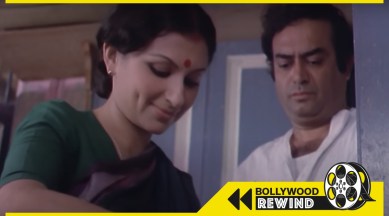Click here to follow Screen Digital on YouTube and stay updated with the latest from the world of cinema.

This week, Netflix recently dropped its latest reality dating show IRL – In Real Love, in which the creators are trying to bridge the gap between the world of online dating and dating in real life for a generation that has grown up while trying to crack the code of how to find love. We are told that love has gotten complicated ever since the concept of online dating was introduced, but that couldn’t be further away from the truth. Love has always been complicated, and so is marriage. Until a few decades ago, the idea of marrying the person you love was nothing less than a battle for a huge section of the society, and there too, the ultimate stamp of approval from one’s parents would be a deal breaker in most relationships. The concept of arranged marriages has been widely accepted by our society for generations and in the first scene of Sanjeev Kumar and Sharmila Tagore-starrer Griha Pravesh, director Basu Bhattacharya tries to focus on the silver lining of such marriages. We are told that one gets a chance to find love after getting married in these arranged marriages, as opposed to other marriages where the love might fizzle out as it can’t be the only factor holding a relationship together.
Griha Pravesh is the story of one such couple – Amar and Mansi – who have found a rhythm in their mundane life. They have one goal, to buy a house and it is for this that they have been pinching pennies from the day they got married. They didn’t even go for a honeymoon because Amar believed that this was a ‘fizool kharcha (wasteful expenditure)’. So when Amar meets Sapna (Sarika) at work, and sees a woman who isn’t afraid of taking chances, he is completely taken by her. Something as simple as trying tea for the first time with her makes his day exciting. Learning that Sapna goes for movies alone makes him say ‘tum kuch bhi kar sakti ho, tum toh akele picture dekhne bhi chali jati ho (You can do anything, you can even go for movies alone)‘. It further emphasises that Amar has never stepped out of line and the idea of being with Sapna is thrilling enough to get his day started.
Basu Bhattacharya, unlike many other storytellers, understood that stories don’t end after a couple gets married. In fact, this is where the plot begins. Griha Pravesh is the third part of his relationships trilogy after Anubhav and Avishkar. Here, much like the other two films, Basu does not pretend that marriages are perfect but he does insist that the promise of this relationship is far bigger than the little temptations that one might encounter.
There’s a scene in the latter half where Amar and Mansi go out for what looks like a date night. She’s excited since they haven’t gone out in years but he is dreading the outing as this is his opportunity to announce that he wants out. As they take a nice romantic walk on Marine Drive, Mansi can’t stop thinking about the dreamy home they could buy but Amar is trying to choose the best words to end his marriage. Late at night, when they are in bed, he declares his decision and she, without missing a beat, instantly confesses that she doesn’t love him either. It is interesting to note that we never see them fight, until she demands to see his girlfriend.
Amar and Mansi have an eight-year-old son and for some reason, the characters, and the filmmaker too, choose to forget about the child’s existence when it comes to the parents’ separation. Amar, in his many conversations with Sapna, never brings up his son when he speaks about his separation. Mansi too, never talks about her son losing his father in case they were to get divorced. Basu throws Babla in another room with a comic book and we never hear from the child again. The child doesn’t exist in their decision making process, which makes you wonder if the father was an absentee all along, and the divorce wouldn’t actually make much difference to his life.
Basu Bhattacharya has Amar living in two worlds – the real world where he lives in an almost dilapidated house with Mansi and the other, where he sips tea with Sapna in a beautiful restaurant. He slips in and out of both these worlds without any awareness but when he catches himself stepping out of line, he wakes up with a jolt.
Through his trilogy, Basu underlines that in the end there is no particular reason for two people to stay married. It might not seem logical to anyone, and even the couple cannot really explain why they let go of the temptations and opportunities they get, to choose each other but that’s just what they do.
Click here to follow Screen Digital on YouTube and stay updated with the latest from the world of cinema.